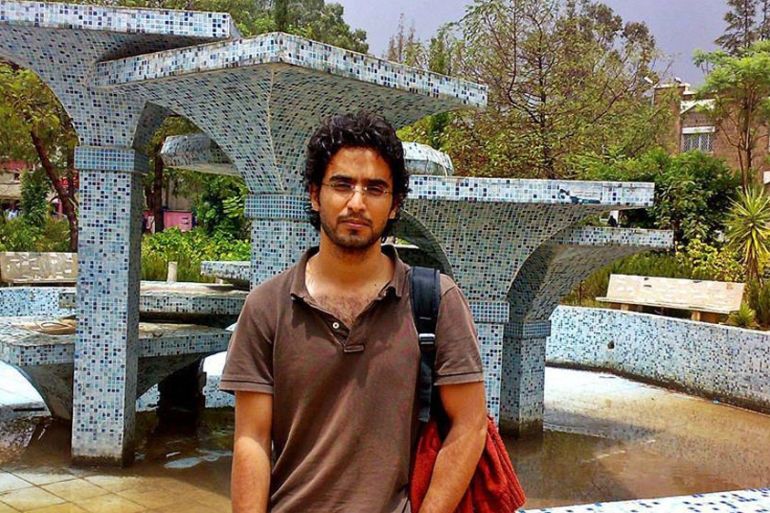Ripped apart: Yemeni couple fearful after Muslim ban
A young Yemeni artist shares his experience of being banned from visiting his wife, who studies in the US.

Prior to US President Donald Trump’s recent Muslim ban, Murad Subay, a Yemeni artist, never had to worry about being able to see his wife, Hadil, who studies in the US on a scholarship.
Following the recent executive order, which placed a travel ban on seven Muslim-majority countries including Yemen, seeing his wife again has become a distant dream.
Keep reading
list of 4 itemsFull jury panel seated on third day of Trump’s New York hush-money trial
Seven jurors seated on the second day of Trump’s New York hush-money trial
Six takeaways from first day of Trump’s New York hush money criminal trial
Subay cannot travel to visit her and fears that if Hadil returns home, she will not be allowed back in the US. What was once a valuable opportunity for Hadil to study political science at Stanford University in California has now turned into a nightmare.
Subay is stuck in a war-ravaged country while his wife lives in a place where foreign Muslims are eyed with suspicion.
Here is Subay’s account of how the Muslim ban changed his life for ever.
READ MORE: Trump’s Muslim ban – This could never happen in America
My wife scored 94.5 percent in her high school final examination. Last year, she went to the US to complete her bachelors and masters.
|
I am astonished at how a country known for defending democracy is implementing such orders. |
Today, she cannot return to her country whenever she likes so long as this decision stays in effect. This will negatively affect her studies and our life.
This ban is absolutely upsetting.
Hadil and I were planning to meet every summer. She can either come to Yemen or I can travel to see her in the US.
That was our plan.
However, with Trump’s Muslim ban in place, entering the US is impossible. Even if she decides to come to Yemen, she may not be able to return to the States.
This is a racist and unreasonable decision.
Now our families are worried about our future. We do not know what lies in store for us. We do not know if this ban will persist or be repealed.
Whatever the difficulties will be, Hadil is going to pursue her studies until 2020 as long as she is permitted to continue. However, the worrying matter is that she must leave America every year to another country where she can renew her visa in any American embassy. She cannot renew the visa in America.
READ MORE: Trump’s Muslim ban ‘will rip our family apart’
We will do our best to support her to complete her studies in America or elsewhere. In Yemen, the education system is weak and it is unfortunately being destroyed.
Hadil is ambitious and hardworking, and I will not let her down.
|
|
She got a scholarship to the US last year, and I was happy that she would be able to receive quality education there. We did not know time would change in America.
There is no justification for banning Muslims from entering the US. All those refugees or immigrants belonging to the seven banned countries including Yemen have not committed any terrorist acts. This is a politically motivated decision, and it intends to show off power and strictness.
Americans themselves will resist this racist decision. It is unreasonable for this unfair decision to succeed.
The majority of the countries targeted by this order are fragile. This is a big problem. We are living in the 21st century. I am astonished at how a country known for defending democracy is implementing such orders. This is an individual deed.
The protests against this decision are ongoing. I hope they will continue.
It would be impossible that the beacon of democracy and freedom blocks people from travelling on racist and religious grounds. Millions of people should not pay the price for terrorist acts carried out by some individuals.
This decision dishonours America.
The consequences of this decision are grave, and I do not think the world will let it pass unopposed. I believe the principles of democracy in America will not be easily abandoned.
As told to Khalid Al-Karimi and Mohammed Al-Sameai.